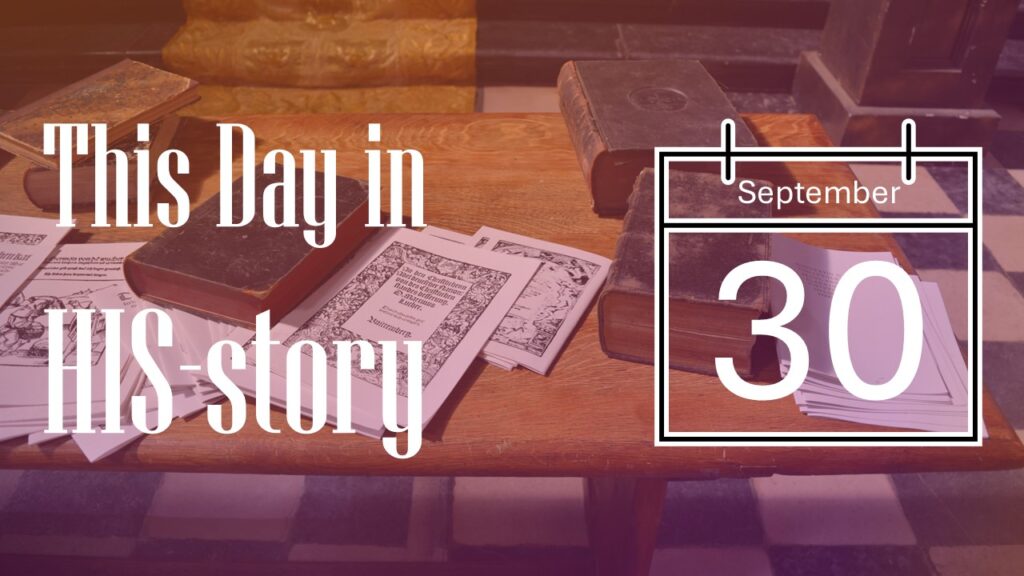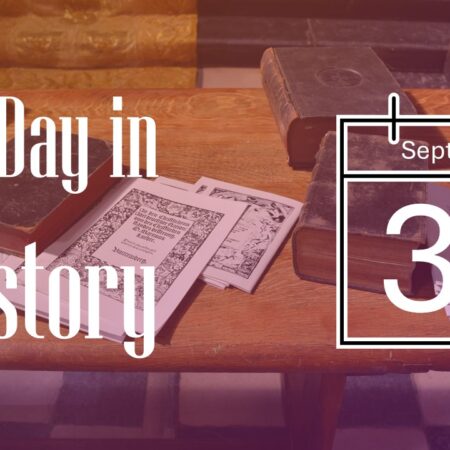
1770
On this day, September 30, 1770, the world lost one of the greatest evangelists and preachers of the Gospel, George Whitefield. His fervent proclamation of the Good News shook two continents, crossing the Atlantic 13 times and delivering over 18,000 sermons. Whitefield once said, “I had rather wear out than rust out”, and he lived up to these words, preaching Christ until his final breath.

Known as the “Lion in the Pulpit,” his passion for lost souls was unparalleled. His sermons stirred thousands to repentance, often with tears in his eyes as he pleaded for sinners to embrace the Savior, saying, “We can preach the Gospel of Christ no further than we have experienced the power of it in our own hearts.” His dramatic delivery, born from a love of theater in his youth, drew crowds in England and the American colonies, sometimes exceeding the population of the towns he preached in.
Whitefield was a pioneer of the Great Awakening, a revival that forever changed the spiritual landscape of Britain and America. His friendship with John and Charles Wesley, fellow giants of the faith, birthed the Methodist movement. Though they had theological differences, Whitefield’s heart for the Gospel and the unity of Christ’s church never wavered. Despite opposition from established clergy, he never ceased proclaiming the need for the new birth, saying, “There are many likewise, who go on in a round of duties, a model of performances… but they have no Christ in their hearts.”
His life was marked not only by his triumphs but by his struggles—his frail health often threatened to end his ministry, yet he pressed on, stating, “Lord Jesus, I am weary in thy work, but not of thy work.” On his final night, with a candle in hand, Whitefield preached to a crowd gathered outside his lodging, determined to speak of Christ one last time.
Today, we remember George Whitefield not only for his extraordinary zeal but for the profound truth that he lived and died for: “Other men may preach the gospel better than I, but no man can preach a better gospel.” May his legacy continue to inspire us to proclaim the name of Jesus with boldness, passion, and love.
1865
Francis Wayland lay desperately ill. On Thursday evening, September 28, his oldest son took his hand and asked, “Do you know me, father.” Francis opened his eyes which seemed filled with affection and answered, “Yes.” But when a younger son arrived from out of state Friday morning, Francis neither opened his eyes nor gave any sign that he heard his boy speak to him. On this day, September 30, 1865, a Saturday evening at twenty minutes to six, the family were gathered at his bedside.

His daughter saw that his body showed signs of change and laid her hand gently on his cheek. Francis’ eyes fluttered open. He took in the sight of his loved ones with complete consciousness, closed his eyes and died.
A long and productive life was over. Through the greater part of his seventy years, Francis Wayland was both a notable Baptist preacher and outstanding educator. If you have been given the option of choosing elective classes in college or in high school, remember that he was a pioneer in electives.
Born in New York City, Francis studied at Andover Theological Center and became a Baptist minister. He served for six years at the First Baptist Church, Boston, and became known for effectual sermons which brought his listeners to repentance and conversion.
Leaving the Boston church, Francis became a professor at Union College and then accepted the position as president of Brown College. He would be there eighteen years, sometimes called the school’s “golden years.”
Although head of this seminary, Francis distrusted seminaries. “The tendency of seminaries is to become schools for theological and philological learning and elegant literature, rather than schools to make preachers of the Gospel,” he said. He was determined that his school not drift with that tide. He himself led in worship and delivered sermons to his students, urging those who were not converted to get right with God.
Francis did not see seminary training as the sole ticket to pastoring. “I was said to be opposed to ministerial education because I held that a man with the proper moral qualifications might be called to the ministry by any church and be a useful minister of Christ and that we had no right to exclude such a man because he had not gone through a nine or ten years’ course of study. God calls men to the ministry by bestowing upon them suitable endowments, and an earnest desire to use them for His service.” These views led him to establish flexible entrance requirements.
He founded the free library of Wayland, Massachussets and won legislation that allowed towns to support public libraries with tax money. After his retirement, he sometimes preached. In his last public sermon, given just days before he died, he urged his listeners to be faithful followers of Jesus. He prayed with them. On his way home, he remarked to the man escorting him that “we do not pray enough; we lack faith in God.”
Francis was also involved in prison work and made such a deep impression on the state prisoners that the prison chapel was filled with sobs when the chaplain announced that he had died.
